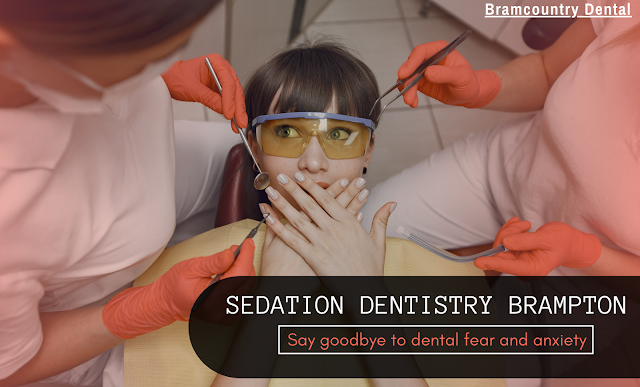Some people have fear and anxiety when
visiting the dentist. Here if you are one suffer this dental phobia then you
may consider advanced sedation dentistry at Brampton dentist.
Some people take a mild sedative, such
as a benzodiazepine, before a visit to the dentist, which is the milder form
of sedation dentistry.
It can help calm nerves and make people
more comfortable going to a dentist. Others may need other medications that
make them less aware of the dental work being done.
There is a difference between sedation
dentistry of more aggressive forms and dental work performed under
general anesthesia.
When you have general anesthesia, you
may need help to maintain your breathing, and this method may be limited to
certain types of oral surgeries.
Many types of medicines can be
swallowed, inhaled, or injected intravenously. These don't induce deep sleep from
general anesthesia, but they usually mean you won't notice much about your
dentist appointments and have few memories of them.
One of the benefits of this type of
dentistry is the ability to do a lot of dental work in one appointment.
If you have a lot of fillings or
crowns, a few root canals, or any other major task, you can usually have all of
those jobs done at the same time. This can be useful for people who have little
time to get to work and often visit the dentist.
Another group of people who could
benefit from this form of dentistry are those with conditions that cause sudden
movements or an inability to control them.
There are even pediatric dentists who
specialize in sedation
dentistry in Brampton, although some medical professionals question the
use of sedation, especially in young children, if it is not necessary.
To ensure safety, you should work with
dentists who are trained in different methods of dental sedation. You will also
need a little extra support for your date.
Since you will be taking or inhaling
medicines that will leave you very calm and sometimes drowsy, you cannot make
these visits. You will need a trustworthy friend or family member to pick you
up and listen to the instructions given by the dentist after the procedure, as
you might not remember them.
Because of the different types of sedation
dentistry, you will want to discuss this with a qualified dentist. You may
have x-rays before undergoing actual procedures, and you may need to give
information about your medical history, any medications you are currently
taking, or any health concerns.
You can usually expect a first visit to
the dentist before they schedule any type of procedure involving sedation.
Your insurance may cover procedures
such as fillings, but does not cover additional medications prescribed or given
to you during the procedure.
Here are some benefits of sedation in dentistry:
- Anxiety is relieved
- Few side effects
- More accomplished during the visit
- No needle
- No pain
- Perfectly safe
- The procedures seem shorter
What types of sedatives are available?
The most popular types of dental
sedatives dental
treatment in Brampton are nitrous oxide, conscious oral
sedation, and intravenous sedation.
Different levels of sedation (light,
moderate, and deep) can be used depending on individual needs.
Here is an overview of some of the more
common types of dental sedatives:
Nitrous oxide
Nitrous oxide is distributed in a nasal
mask and is administered throughout the procedure.
Nitrous oxide uplifts your mood and can
make you feel good. Also, some tingling and numbness may be felt.
Intravenous sedation
Intravenous sedation is moderate
sedation. Patients who have received intravenous sedation often report that
they feel like they have slept the entire procedure.
Usually, intravenous sedation is used
for short treatments. It is given by injection directly into the bloodstream,
which means the effects are immediate.
Sometimes patients feel dizzy and
sleepy when the sedative is withdrawn. This is why it is important to have a
designated driver with you for the return home.
Conscious oral sedation
Conscious oral sedation is a great
choice for people who fear injections.
Usually, a dose of medication is taken
before the appointment and then supplemented during the procedure, if
necessary.
What types of drugs are used in conscious oral sedation?
Most of the drugs used for sedation in
dentistry are in the class of benzodiazepines. Each drug has a different
half-life, which means that the effects last longer or shorter. The estimated
length of the procedure determines which type of medication will be most
effective.

Comments
Post a Comment